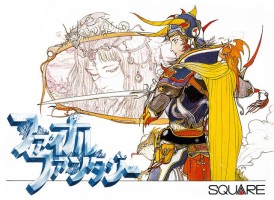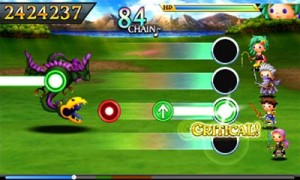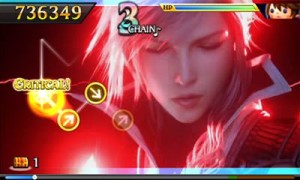Theater, Rhythm: A History of Final Fantasy
Theatrhythm Final Fantasy: Curtain Call is a living museum of Final Fantasy, an interactive musical memory palace. It lives at the bizarre intersection of fan service and Wikia, of sweet memory and bittersweet nostalgia. It is impossible to play Theatrhythm without remembering these games and where you were in your life when you played them; in fact, that’s more or less the whole point of the enterprise. When you start a new game the first thing you do is pick the four characters who will form your starting party; it’s a Voight-Kampff test for a single IP. Which Final Fantasy games do you love? Which ones can you do without? The game is eager to please and desperately wants to make a good first impression. Have you been playing Final Fantasy since the very beginning? Then why not start with “The Warrior of Light”?
…I was ten years old, and I wanted Final Fantasy more than I’d ever wanted anything in my life. I’d memorized every page, every screen of the three-issue Nintendo Power preview. I’d read the free Nintendo Player’s Guide until the cover fell off. Christmas was just around the corner, and I pestered my parents so relentlessly they forbade me to speak the words “Final Fantasy” aloud. Undeterred, I started asking for a “Cantsay,” and when that was proscribed as well, started delivering messages from my stuffed animals. It’s not me, mom. It’s Piglet. Piglet wants Final Fantasy for Christmas. Please.
 Santa was more forgiving than my parents, and Final Fantasy showed up under the tree. I finished the game with the Player’s Guide-canonical party of Fighter/Monk/White Mage/Black Mage, then immediately started again with some Red Mages and Thieves. My third game was all Mages; after that, four White Mages, just to prove that I could. For a few months, I lived in Sakaguchi’s world. I knew the layout of every dungeon and the contents of every treasure chest. I knew everything there was to know about the game.
Santa was more forgiving than my parents, and Final Fantasy showed up under the tree. I finished the game with the Player’s Guide-canonical party of Fighter/Monk/White Mage/Black Mage, then immediately started again with some Red Mages and Thieves. My third game was all Mages; after that, four White Mages, just to prove that I could. For a few months, I lived in Sakaguchi’s world. I knew the layout of every dungeon and the contents of every treasure chest. I knew everything there was to know about the game.
So I know, deep in my bones, that there’s no such character as “The Warrior of Light,” not really. “The Warrior of Light” doesn’t actually appear in Final Fantasy–he is a marketing construct based on Amano’s iconic Japanese box art. All the other Final Fantasy games have named protagonists who can cleanly and clearly represent their installments, so now the first game does, too. It might not be the true history I remember, but Theatrhythm hopes I’m willing to overlook these inconsistencies. It would be tidier, wouldn’t it?
At least the other characters I can choose for my starting party are “real.” Not just in the sense that they actually appear in their respective games. They are from what I consider “real” Final Fantasy games. Everyone keep their own list, right? The games that count, and the ones that don’t. The Super Nintendo games are “real,” obviously. The PlayStation games, too, but, you know, in a different way. Still real, though.
 Maybe certain games seem more real because my life seemed more real then, too. I grew up with Final Fantasy, and Final Fantasy grew up with me. Final Fantasy II came out as I started middle school. Final Fantasy III hit stores when I was a high school freshman. Final Fantasy VII came out literally days before I went off to college, and I blew through 40 hours in 5 days. These games are the Final Fantasy I like to remember; games full of charming characters, puzzling boss fights, and insane ambition. If the series’ shine has waned in recent years, it’s partly because every other AAA game has remade itself in Final Fantasy’s image, packed full of polish, pathos, and piles of experience points.
Maybe certain games seem more real because my life seemed more real then, too. I grew up with Final Fantasy, and Final Fantasy grew up with me. Final Fantasy II came out as I started middle school. Final Fantasy III hit stores when I was a high school freshman. Final Fantasy VII came out literally days before I went off to college, and I blew through 40 hours in 5 days. These games are the Final Fantasy I like to remember; games full of charming characters, puzzling boss fights, and insane ambition. If the series’ shine has waned in recent years, it’s partly because every other AAA game has remade itself in Final Fantasy’s image, packed full of polish, pathos, and piles of experience points.
But while other franchises are happy to pick away at Final Fantasy’s bones, the soundtracks have never quite been duplicated, and that’s where Theatrhythm wisely chooses to stake its emotional claim. Most modern game scores aim for pure filmic bombast, but Final Fantasy soundtracks have always mixed their John Williams-esque leitmotifs with prog rock basslines and offbeat experimentation. Say a song “sounds like Final Fantasy,” and most gamers will immediately know what you’re talking about. These days, it’s hard to remember an age of musical scarcity, but back in the 90s, I traded cassette tapes with other fans on Usenet to complete my Final Fantasy soundtrack collection. Each tape was marked by different handwriting, dubbed as it had been by a different munificent stranger, and I carried my rack of mismatched cassettes from house to house like a reliquary. This music was my music, and it mattered to me. I loved – I still love – Final Fantasy’s music.
But I don’t think I love Final Fantasy anymore, and it’s easy to pinpoint the reason why. There, at the end of the character select screen, is Final Fantasy’s own Yoko Ono: Lightning. I hate Lightning. I hate Lightning with a passion all out of proportion to her Saltine-cracker personality. I remember bitterly walking away from Final Fantasy XIII after 10 increasingly confused hours. I felt hurt! What had the series I loved so much become? Square had let me down. Even worse, by walking away from the game unfinished, I felt like I was letting Square down, too. If that sounds like ridiculous hyperbole, I’m sorry. Most breakups do from the outside.
 And yet, when I fire up Theatrhythm, Lightning is always going to turn up like a bad penny. Whether I want it or not, the jukebox will always be well-stocked with songs from Final Fantasy XIII, Final Fantasy XIII-2, and Lightning Returns: Final Fantasy XIII. No matter how strongly my personal head-canon rejects her, the game can only tell the truth: this is what Final Fantasy has become. I know there must be 16-year-old kids who love Lightning, who think she’s a cool and collected badass, who fire up the game and jump straight to Dissidia and Final Fantasy XIII, wondering how their parents ever lived with those God-awful chiptunes. And that’s okay. We love two different Final Fantasies.
And yet, when I fire up Theatrhythm, Lightning is always going to turn up like a bad penny. Whether I want it or not, the jukebox will always be well-stocked with songs from Final Fantasy XIII, Final Fantasy XIII-2, and Lightning Returns: Final Fantasy XIII. No matter how strongly my personal head-canon rejects her, the game can only tell the truth: this is what Final Fantasy has become. I know there must be 16-year-old kids who love Lightning, who think she’s a cool and collected badass, who fire up the game and jump straight to Dissidia and Final Fantasy XIII, wondering how their parents ever lived with those God-awful chiptunes. And that’s okay. We love two different Final Fantasies.
But there’s a lot more than two Final Fantasies. There’s an infinite number. Everyone has their favorites and no one can ever agree; “rank the Final Fantasy games” is a well-worn Internet joke, because you simply can’t. Even fans who broadly agree – preferring the Super Nintendo games to the PlayStation’s – find themselves mired in conflict as soon as they start to dig a little deeper. We are not ever going to agree, and that’s okay.
By necessity, Theatrhythm is forced to embrace this multiversal view of Final Fantasy. It features 221 songs not because each one is a timeless classic, but because sheer volume is Square’s only hope of hitting each player’s personal endorphin trigger. Theatrhythm is Square asking you, “Hey, remember when…” 221 times in a row and hoping you say “yes” at least once.
But you’ll say “no” a few times, too. Playing the game is like looking through your family photos and recognizing only half the faces; an off-putting mixture of nostalgia and unease. Sure, you’ll remember your favorite moments, but you’ll feel indifference or outright hostility at others. Whose Final Fantasy is it, anyway? Am I truly remembering the Final Fantasy of my childhood and the years of good memories we forged together? Or is Square’s carefully manufactured history starting to overwrite my own? I can’t be sure, and that unnerves me.
Now when I play Theatrhythm, the only way I can enjoy it is on the highest difficulty, where I’m so busy hitting buttons that I don’t have time to think about the fan service, the historical revisionism, or the desperate pandering. All that melts away in a maelstrom of button-mashing until nothing is left but me and the music. And that’s the way I want to remember Final Fantasy.









